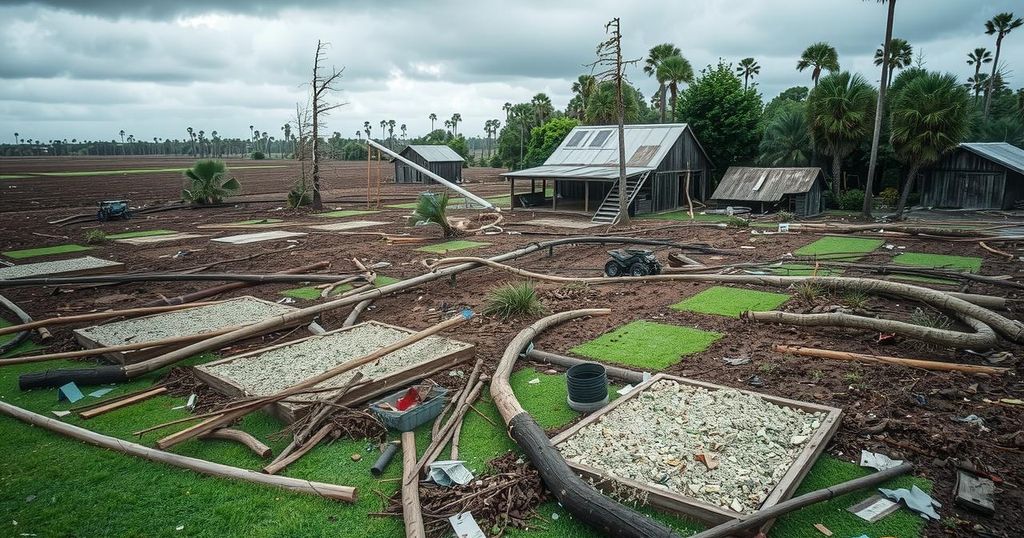Farmers in Georgia Struggle to Recover Following Devastating Hurricane Helene

More than two months after Hurricane Helene caused extensive damage to crops and infrastructure across the South, Georgia farmers continue to face significant challenges. Estimated agricultural losses exceed $10 billion, severely affecting cotton and poultry production. The need for financial support and recovery assistance is urgent as farmers like Chris Hopkins and Jeffrey Pridgen navigate the aftermath of the devastation.
Farmers in Georgia continue to suffer significant losses more than two months after Hurricane Helene devastated their crops and infrastructure. The storm made landfall as a major Category 4 hurricane on September 26, inflicting severe damage across several Southern states, including Georgia. Chris Hopkins, a cotton, corn, and peanut farmer, exemplifies the challenges faced by many colleagues, as he contemplates whether to rebuild or abandon his efforts.
The damage wrought by Hurricane Helene is extensive, with estimates surpassing $10 billion for farmers and agribusinesses from Florida to Virginia. The impact includes destroyed crops, uprooted timber, compromised farm equipment, and losses at processing facilities. Particularly among cotton growers, crops were affected at a critical harvest period, with Georgia farmers alone incurring losses of approximately $5.5 billion.
Hopkins reported that he has lost nearly half of his cotton production, estimating a financial loss of about $430,000. While insurance may partially compensate for the losses, it will not cover the entire expense of repairs and debris removal. The hurricane wreaked havoc on various crops, including pecans and fall vegetables like cucumbers and squash.
In addition to direct damages, Helene resulted in the destruction of hundreds of poultry houses vital to chicken production, particularly affecting farmers like Jeffrey Pridgen, who lost four of his dozen houses. The poultry industry within Georgia faces an estimated loss of $683 million, prompting many farmers to begin the lengthy recovery process.
Despite these hardships, experts suggest that consumer prices are unlikely to rise significantly, as crops from other regions can fulfill market demand. However, the pecan supply may experience more notable impact, as Georgia accounts for about one-third of the nation’s production.
In light of these substantial losses, the Georgia government has redirected funds to support emergency loans for farmers. Furthermore, a disaster aid proposal is under consideration in Congress to provide much-needed support.
As the agricultural community in Georgia continues to navigate the aftermath of Hurricane Helene, the long-term recovery and rebuilding efforts will be crucial in restoring productivity and sustainability for those affected.
Hurricane Helene struck the Southern United States on September 26, 2022, making landfall in Florida and subsequently affecting Georgia among other states. The hurricane was classified as a major Category 4 storm and resulted in astonishing losses for farmers across the affected regions. In particular, crops such as cotton, pecans, and fall vegetables suffered severe damage, and the impact on the poultry industry was also significant.
The lasting repercussions of Hurricane Helene are still heavily felt among Georgia farmers, as they confront an uphill battle of recovering financially and operationally. With estimated losses exceeding $10 billion across the Southern agriculture sector, government intervention and potential federal support are becoming increasingly vital. The experience of farmers like Chris Hopkins and Jeffrey Pridgen encapsulates the emotional and economic tax that the storm has enforced, emphasizing the need for swift recovery efforts to restore the agriculture industry’s resilience.
Original Source: abcnews.go.com








